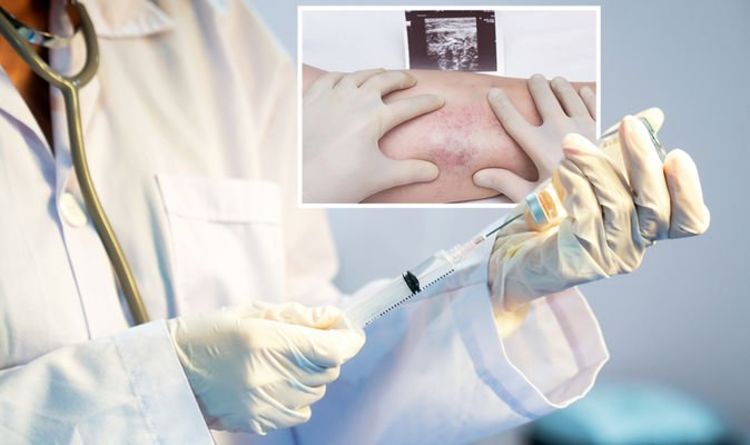Janssen Covid vaccine approved for UK use – PHE issues important blood clot advice

The Medicines and Healthcare products Regulatory Agency (MHRA) – the UK’s regulatory body for medicines – has given the green light to a single-dose Covid vaccine made by Janssen. The vaccine has been shown to have an 85 percent effectiveness in stopping severe illness from COVID-19 in trials and has met all the rigorous safety standards. However, a small number of reports link the vaccine to an extremely rare blood clot complication.
A combination of blood clots and low levels of platelets (cells that help blood to clot) in the blood has been observed extremely rarely following vaccination with COVID-19 Vaccine Janssen.
According to Public Health England (PHE), this includes severe cases with blood clots, including in unusual locations, such as the brain, liver, bowel and spleen in some cases in combination with bleeding.
These cases occurred within the first three weeks following vaccination and occurred mostly in women below 60 years of age.
“Fatal outcome has been reported,” reports PHE.
READ MORE: You can catch Covid after being vaccinated – four symptoms
How to respond
According to the health body, you should seek immediate medical attention if you experience severe or persistent headaches, seizures (fits) mental status changes or blurred vision or unexplained skin bruising beyond the site of vaccination which appear a few days after vaccination.
You should also seek help immediately if you notice pinpoint round spots beyond the site of vaccination, develop shortness of breath, chest pain, leg pain, leg swelling, or persistent abdominal pain, it adds.
“Inform your healthcare provider that you have recently received COVID-19 Vaccine Janssen.”
The link to blood clots
The rare type of blood clot has also been reported in a number of people after they received the AstraZeneca coronavirus vaccine.
DON’T MISS
Diabetes type 2: Texture of your hand is a symptom [INSIGHT]
How to get rid of visceral fat: Simple dietary swap [TIPS]
B12 deficiency: Three physical signs to spot [ADVICE]
Both vaccines use the same technology, which researchers now claim could be the cause of rare blood clot disorder.
COVID-19 vaccines that employ adenovirus vectors – cold viruses used to deliver vaccine material – send some of their payload into the nucleus of cells.
German researchers recently claimed that some of the instructions for making coronavirus proteins can be misread this way, potentially triggering blood clot disorders in a small number of recipients.
According to Dr Rolf Marschalek, a professor at Goethe University who led the study, after entering the nucleus, parts of the spike protein splice or split apart and create mutant versions which are unable to bind to the cell membrane.
The spike protein is found on the surface of the virus that causes COVID-19. It facilitates the coronavirus’ entry into host cells.
These mutant versions then enter the body and trigger the rare blood clots, Dr Marschalek suggested.
The finding makes it likely that the Janssen – Johnson & Johnson’s pharmaceutical arm – vaccine will be advised for older adults and discouraged for younger people.
Under-40s are being offered an alternative to AstraZeneca in the UK because of the potential link to a type of rare blood clot in the brain.
Nonetheless, the UK’s approval of the one-dose vaccine bolstered the fight against COVID-19.
A welcome development amid fears the UK could be on the cusp of a third wave.
The single dose regimen should speed up the rollout to vulnerable people in care homes and those living in remote locations.
The vaccine’s efficacy against the new India variant, which is spreading fast in the UK, is yet to be established.





